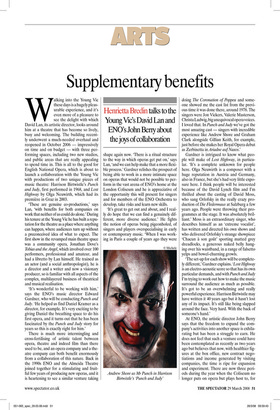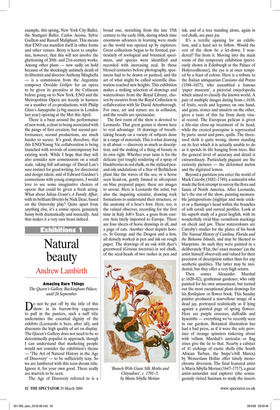Supplementary benefits
Henrietta Bredin talks to the Young Vic’s David Lan and ENO’s John Berry about the joys of collaboration
Walking into the Young Vic these days is a hugely pleasurable experience, and it’s even more of a pleasure to see the delight with which David Lan, its artistic director, looks around him at a theatre that has become so lively, busy and welcoming. The building recently underwent a much-needed overhaul and reopened in October 2006 — impressively on time and on budget — with three performing spaces, including two new studios, and public areas that are really appealing to spend time in. This is all to the good for English National Opera, which is about to launch a collaboration with the Young Vic with productions of two unique pieces of music theatre: Harrison Birtwistle’s Punch and Judy, first performed in 1968, and Lost Highway by Olga Neuwirth, which had its première in Graz in 2003.
‘These are genuine co-productions,’ says Lan, ‘with benefits for both companies on work that neither of us could do alone.’ During his tenure at the Young Vic he has built a reputation for the theatre as a place where anything can happen, where audiences turn up without a preconceived idea of what to expect. The first show in the revamped main theatre space was a community opera, Jonathan Dove’s Tobias and the Angel, which involved over 100 performers, professional and amateur, and had a libretto by Lan himself. He trained as an actor (and a social anthropologist), he is a director and a writer and now a visionary producer, so is familiar with all aspects of the complex, multilayered business of theatrical and musical realisation.
‘It’s wonderful to be working with him,’ says the ENO’s music director Edward Gardner, who will be conducting Punch and Judy. ‘He helped us find Daniel Kramer as a director, for example. It’s very exciting to be giving Daniel the breathing space to do his first opera, and it turns out that he has been fascinated by the Punch and Judy story for years so this is exactly right for him.’ There is much more intermingling and cross-fertilising of artistic talent between opera, theatre and indeed film than there used to be, and an opera company and a theatre company can both benefit enormously from a collaboration of this nature. Back in the 1990s ENO and the Almeida Theatre joined together for a stimulating and fruitful few years of producing new operas, and it is heartening to see a similar venture taking shape again now. ‘There is a ritual structure to the way in which operas get put on,’ says Lan, ‘and we can help make that a more flexible process.’ Gardner relishes the prospect of being able to work in a more intimate space on operas that would not be possible to perform in the vast arena of ENO’s home at the London Coliseum and he is appreciative of the opportunity this will present for singers and for members of the ENO Orchestra to develop, take risks and learn new skills.
‘It’s great to get out and about, and I really do hope that we can find a genuinely different, more diverse audience.’ He fights the notion of operas being pigeonholed, of singers and players overspecialising in early or contemporary music. ‘When I was working in Paris a couple of years ago they were doing The Coronation of Poppea and someone showed me the cast list from the previous time it was done there, around 1978. The singers were Jon Vickers, Valerie Masterson, Christa Ludwig, big unequivocal opera voices. I loved that. In Punch and Judy we’ve got the most amazing cast — singers with incredible experience like Andrew Shore and Graham Clark alongside Gillian Keith, for example, just before she makes her Royal Opera debut as Zerbinetta in Ariadne auf Naxos.’ Gardner is intrigued to know what people will make of Lost Highway, in particular. ‘It’s a complete unknown for people here. Olga Neuwirth is a composer with a huge reputation in Austria and Germany, also in France, but she’s had very little exposure here. I think people will be interested because of the David Lynch film and I’m thrilled about the casting of David Moss, who sang Orlofsky in the really crazy production of Die Fledermaus at Salzburg a few years ago. People were throwing their programmes at the stage. It was absolutely brilliant.’ Moss is an extraordinary singer, who describes himself as an ‘extreme vocalist’, has written and directed his own shows and who delivered Orlofsky’s strange showpiece ‘Chacun à son goût’ sporting matted grey dreadlocks, a generous naked belly hanging over his waistband, in a range of falsetto yelps and bowel-churning growls.
‘The set-up for each show will be completely different,’ Gardner explains. ‘Lost Highway is an electro-acoustic score so that has its own particular demands, and with Punch and Judy I’m trying to work out how to make the music surround the audience as much as possible. It’s got to be an overwhelming and really powerful experience. Harrison Birtwistle may have written it 40 years ago but it hasn’t lost any of its impact. It’s still like being slapped around the face. Very hard. With the back of someone’s hand.’ At ENO, the artistic director John Berry says that the freedom to expand the company’s activities into another space is exhilarating but has been a struggle to earn. He does not feel that such a venture could have been contemplated as recently as two years ago but believes that now, with healthier figures at the box office, new contract negotiations and income generated by visiting companies, the time is ripe for expansion and experiment. There are now three periods during the year when the Coliseum no longer puts on opera but plays host to, for example, this spring, New York City Ballet, the Stuttgart Ballet, Carlos Acosta, Sylvie Guillem and Russell Maliphant. This means that ENO can manifest itself in other forms and other venues. Berry is keen to emphasise, however, that this will not involve the ghettoising of 20thand 21st-century works. Among other plans — now sadly on hold because of the shockingly untimely death of its librettist and director Anthony Minghella — is a commission from the Argentine composer Osvaldo Golijov for an opera to be given its première at the Coliseum before going on to New York. ENO and the Metropolitan Opera are keenly in harness on a number of co-productions, with Philip Glass’s Satyagraha (a big success in London last year) opening at the Met this April.
There is a buzz around the performance of new work, a clout to being associated with the pangs of first creation, but second performances, second productions, are much harder to secure. It’s good, therefore, that this ENO/Young Vic collaboration is being launched with revivals of contemporary but existing work. While I hope that they will also consider new commissions on a small scale, taking full advantage of David Lan’s sure instinct for good writing, for directorial and design talent, and of Edward Gardner’s connections with young composers, I would love to see some imaginative choices of operas that could be given a fresh airing. What about Julian Grant’s A Family Affair, with its brilliant libretto by Nick Dear, based on the Ostrovsky play? Quite apart from anything else, it’s a comic opera, genuinely funny both dramatically and musically. And that makes it a very rare beast indeed.

















































































 Previous page
Previous page